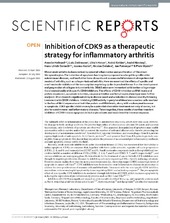| dc.contributor.author | Hellvard, Annelie | en_US |
| dc.contributor.author | Zeitlmann, Lutz | en_US |
| dc.contributor.author | Heiser, Ulrich | en_US |
| dc.contributor.author | Kehlen, Astrid | en_US |
| dc.contributor.author | Niestroj, André | en_US |
| dc.contributor.author | Demuth, Hans-Ulrich | en_US |
| dc.contributor.author | Koziel, Joanna | en_US |
| dc.contributor.author | Delaleu, Nicolas | en_US |
| dc.contributor.author | Potempa, Jan | en_US |
| dc.contributor.author | Mydel, Piotr Mateusz | en_US |
| dc.date.accessioned | 2017-05-24T13:44:55Z | |
| dc.date.available | 2017-05-24T13:44:55Z | |
| dc.date.issued | 2016-08-11 | |
| dc.Published | Hellvard A, et al. Inhibition of CDK9 as a therapeutic strategy for inflammatory arthritis. Scientific Reports. 2016;6:31441 | eng |
| dc.identifier.issn | 2045-2322 | |
| dc.identifier.uri | https://hdl.handle.net/1956/15899 | |
| dc.description.abstract | Rheumatoid arthritis is characterised by synovial inflammation and proliferation of fibroblast-like synoviocytes. The induction of apoptosis has long been proposed as a target for proliferative autoimmune diseases, and has further been shown to act as a successful treatment of experimental models of arthritis, such as collagen-induced arthritis. Here we examined the effects of specific oral small-molecule inhibitors of the transcription regulating cyclin-dependent kinase 9 on the development and progression of collagen-induced arthritis. DBA/1 mice were immunised with bovine collagen type II and treated orally with specific CDK9 inhibitors. The effects of CDK9 inhibition on RNA levels and protein expression, apoptosis induction, caspase activation and lymphocyte phenotype were further analysed. Mice showed a significant delay in disease onset and a reduction in disease severity following treatment with CDK9 inhibitors. Inhibiting CDK9 activity in peripheral blood mononuclear cells resulted in the loss of Mcl-1 expression at both the protein and RNA levels, along with a subsequent increase in apoptosis. CDK9 specific inhibitors may be a potential alternative treatment not only of cancer, but also for autoimmune- and inflammatory diseases. Taken together, these results show that transient inhibition of CDK9 induces apoptosis in leukocyte subsets and modulates the immune response. | en_US |
| dc.language.iso | eng | eng |
| dc.publisher | Nature Publishing Group | eng |
| dc.rights | Attribution CC BY | eng |
| dc.rights.uri | http://creativecommons.org/licenses/by/4.0 | eng |
| dc.title | Inhibition of CDK9 as a therapeutic strategy for inflammatory arthritis | en_US |
| dc.type | Peer reviewed | |
| dc.type | Journal article | |
| dc.date.updated | 2017-05-09T09:40:58Z | |
| dc.description.version | publishedVersion | en_US |
| dc.rights.holder | Copyright 2016 The Author(s) | |
| dc.identifier.doi | https://doi.org/10.1038/srep31441 | |
| dc.identifier.cristin | 1407841 | |
| dc.source.journal | Scientific Reports | |

